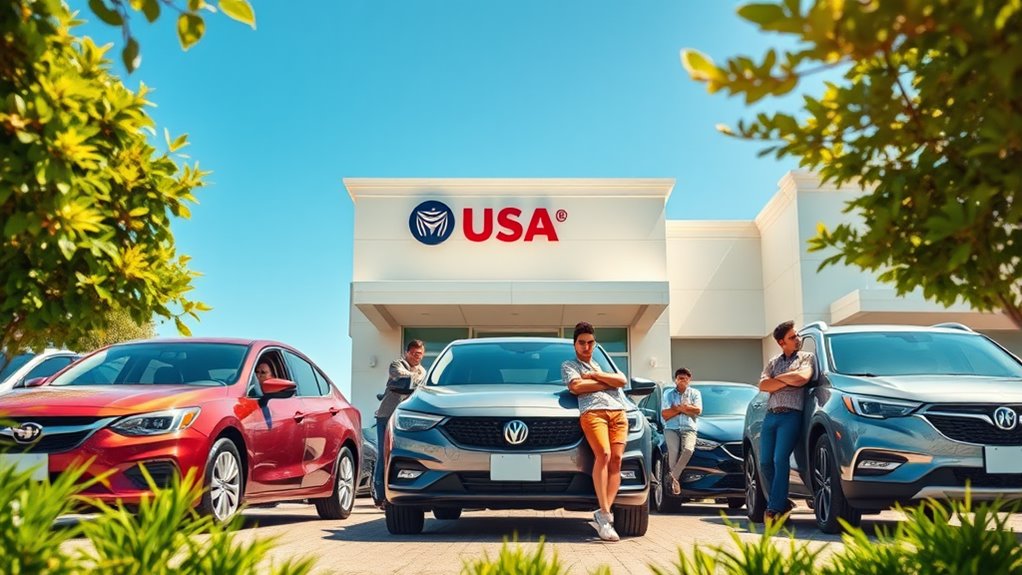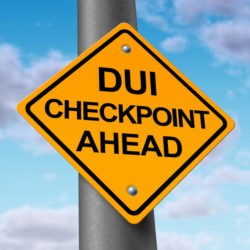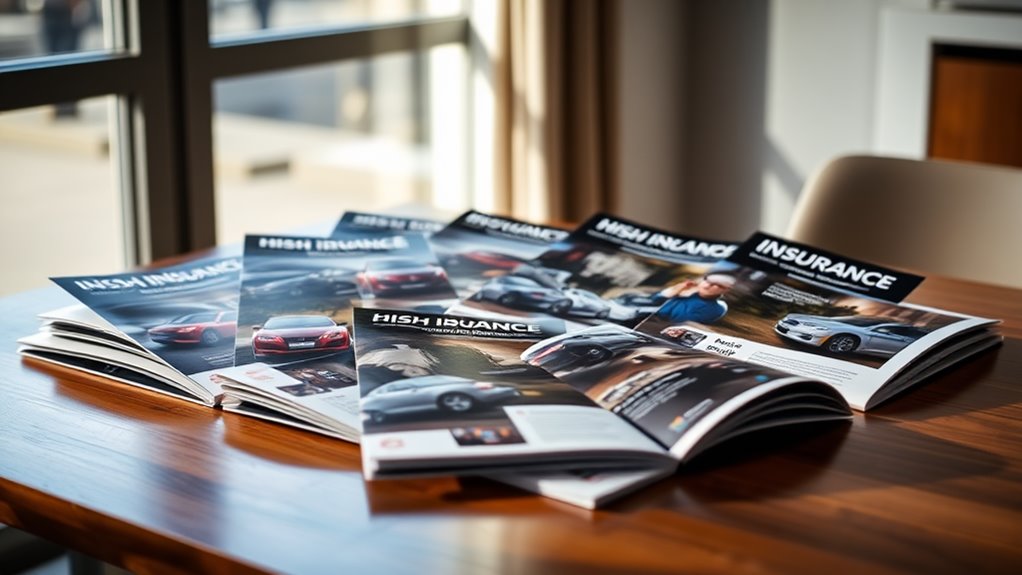If you’re classified as a high-risk driver, steering through insurance options can be challenging. Various providers cater to your unique needs, each with distinct offerings and benefits. Understanding these options can help you find the right coverage that balances affordability with necessary protection. Let’s explore the top 10 insurance options available for high-risk drivers and see which could be the best fit for your situation.
Key Takeaways
- State Farm offers competitive rates and SR-22 insurance, averaging $2,778 annually for high-risk drivers.
- GEICO provides affordable SR-22 options and direct filing, maintaining competitive rates despite potential premium increases.
- Progressive specializes in DUI coverage, offering “second-chance” insurance and immediate SR-22 filing with an average rate increase of 13%.
- USAA offers budget-friendly rates for military members and families, including accident forgiveness and various discounts.
- Nationwide provides lower premiums for high-risk drivers with poor credit, averaging $1,999 annually, with flexible coverage options available.
State Farm: Reliable Rates for High-Risk Drivers

When it comes to insuring high-risk drivers, State Farm stands out as a reliable option, consistently offering competitive rates that cater to your specific needs.
As the largest insurer in the U.S., State Farm effectively addresses the challenges faced by high-risk drivers, providing quality coverage without exorbitantly increased premiums. Their specialized non-standard policies include essential coverages similar to standard options, but with a focus on affordability. On average, annual premiums for high-risk drivers hover around $2,778, often lower than national averages for specific scenarios. Additionally, State Farm’s high ratings for service, specifically a score of 4.60 out of 5, reflect their commitment to customer satisfaction, making them a strong choice for those classified as high-risk. High-risk drivers often experience significant rate increases after accidents, but State Farm’s structured approach helps mitigate these costs effectively. Moreover, they also offer SR-22 insurance for drivers who need to demonstrate financial responsibility due to license suspensions or other violations, ensuring compliance with state regulations.
GEICO: Affordable Options for SR22 Insurance
If you’re a high-risk driver needing SR-22 insurance, GEICO offers a range of affordable options tailored to your circumstances.
They provide coverage for both vehicle owners and non-owners, guaranteeing flexibility based on your needs. GEICO files the SR-22 form directly with your state’s DMV, simplifying the certification process.
While an SR-22 may increase your premiums due to its association with high-risk behavior, GEICO maintains competitive rates and offers various discounts that could help lower your overall costs.
Additionally, they charge a one-time filing fee, which varies by state. Their customer support is dedicated to assisting you with the SR-22 process, making it easier to assure compliance with state regulations.
Progressive: Second-Chance Coverage for DUIs
For high-risk drivers with DUIs, Progressive offers a valuable option known as “second-chance” coverage, designed to meet your unique insurance needs. This coverage allows you to secure insurance even after a DUI, with the added benefit of immediate SR-22 filing if required by your state.
On average, a DUI increases your insurance rates by about 13%, which is lower than many competitors. Progressive maintains coverage for accidents up to policy limits, ensuring protection despite your record.
While DUIs can remain on your record for 3 to 10 years, Progressive’s rates remain competitive, typically averaging $2,656 annually. Their approach emphasizes compliance with state laws, making them a reliable choice for those needing a second chance.
USAA: Budget-Friendly Rates for Eligible Drivers

USAA stands out as a top choice for eligible high-risk drivers, primarily due to its budget-friendly rates and tailored coverage options.
If you’re an active-duty military member, veteran, or family member, you can benefit from some of the lowest premiums available for high-risk categories, including at-fault accidents and speeding tickets.
Policies often feature accident forgiveness, helping to mitigate potential rate increases after infractions. Additionally, USAA offers discounts for good grades and basic driver training, making it accessible for new drivers.
USAA’s policies include accident forgiveness and discounts for good grades, making coverage more affordable for new drivers.
While membership is exclusive, the positive customer service reviews and affordability make USAA an attractive option for those who qualify, often outperforming traditional insurers like GEICO and State Farm regarding pricing and satisfaction.
Nationwide: Competitive Premiums for Poor Credit
How can high-risk drivers secure affordable insurance despite poor credit?
Nationwide stands out by offering considerably lower premiums for drivers with poor credit, averaging around $1,999 annually compared to the market average of $2,813. This competitive pricing is approximately a 29% discount, making it a viable option for those facing high-risk classifications.
Nationwide’s extensive coverage options and flexible application process accommodate diverse driver profiles, ensuring accessibility. Additionally, various discounts—like multi-policy and good student discounts—can further lower costs.
For low-mileage drivers, pay-per-mile options provide financial flexibility. Overall, Nationwide effectively mitigates the premium increases typically associated with bad credit, making it a strong choice for high-risk drivers seeking affordable insurance solutions.
Kemper: Non-Standard Policies With Positive Reviews
While securing insurance can be challenging for high-risk drivers, Kemper offers non-standard policies that cater specifically to those who might struggle to find coverage through traditional insurers.
With a focus on providing auto insurance, Kemper features liability, collision, and extensive coverage designed for non-standard buyers. Their strong A- “Excellent” rating from A.M. Best reflects their financial stability, making them a reliable option in the market.
However, keep in mind that premiums may be higher due to their niche focus. Customer feedback suggests mixed experiences with support and claims, but their lower complaint index compared to peers indicates relatively satisfactory service for preferred clients.
It’s wise to compare quotes to guarantee you’re getting the best rate possible.
The General: Coverage for Drivers Denied Elsewhere

For drivers who’ve faced challenges in securing auto insurance elsewhere, The General offers a viable solution with its specialized coverage options. This insurer caters specifically to high-risk drivers, including those with DUIs, multiple traffic violations, and gaps in insurance history.
One significant advantage is that The General doesn’t require prior insurance, making it accessible for those without a coverage history. Additionally, it provides affordable payment plans tailored to various financial situations, ensuring inclusivity.
While coverage options may be limited in some states, The General maintains a competitive market position by offering flexible policies. Overall, its reputation for assisting high-risk drivers highlights its commitment to making auto insurance available to those who need it most.
Direct Auto: Affordable Non-Standard Insurance
Direct Auto Insurance stands out as a key player in providing affordable non-standard insurance options tailored for high-risk drivers. This company specializes in offering coverage to individuals often overlooked by standard insurers, with options like personal injury protection and extensive coverage.
If you’re facing severe violations, Direct Auto also provides SR-22 filings. Their flexible payment plans cater to different budgets, allowing you to manage your finances effectively. Average premiums are around $3,204 for full coverage, with discounts up to 25% available for military personnel and good students.
Additionally, their mobile app facilitates policy management and claim filing, ensuring you have support when you need it. Overall, Direct Auto delivers essential coverage and flexibility for high-risk drivers.
Arizona-Specific Options: GEICO and American Family
Steering through insurance options as a high-risk driver in Arizona can be challenging, but two prominent providers, GEICO and American Family, stand out for their competitive offerings.
GEICO averages an annual premium of $1,181, making it one of the most affordable choices for high-risk drivers, including those with DUIs or multiple accidents. Its strong financial stability and positive reputation further enhance its appeal.
GEICO offers high-risk drivers an affordable annual premium of $1,181, backed by strong financial stability and a positive reputation.
Meanwhile, American Family also averages $1,181 annually, with a focus on drivers with DUIs and features like accident forgiveness.
Both companies provide opportunities for discounts and are well-regarded in Arizona, ensuring that high-risk drivers can find reasonable coverage options tailored to their needs.
Assigned Risk Insurance: A Last Resort for Coverage
Although finding suitable insurance can be challenging for high-risk drivers, assigned risk insurance serves as an important safety net when standard options are unavailable. This coverage, mandated by state law, is designed for individuals who’ve been denied by multiple insurers due to a poor driving record or other high-risk factors.
Typically, you’ll need to prove your denial before applying. Assigned risk plans are often more expensive, reflecting the increased risk insurers face, and they usually cover essential areas such as auto liability.
Participation is mandatory for all insurers in your state, ensuring that you have options, albeit limited. Ultimately, assigned risk insurance is a vital resource, ensuring you remain compliant with legal requirements despite your risk profile.
Why Is SR22 Insurance Reinstatement Important in California?
Imagine standing at a crossroads, with one path leading to freedom and the other to restrictions. SR22 insurance reinstatement is essential in California for drivers seeking to regain their privileges after serious violations like DUIs or accidents with uninsured motorists. It acts as proof of financial responsibility required by the DMV. Without it, you risk facing fines or further penalties that could jeopardize your ability to drive. So, how do you navigate this complex process?
If you’ve faced serious traffic offenses in California, understanding SR22 insurance reinstatement is vital for regaining your driving privileges. This requirement emerges from the state’s financial responsibility laws, aiming to guarantee that drivers have adequate liability coverage after significant violations, like DUI or accidents involving uninsured drivers. By filing an SR22, your insurance company provides proof of liability coverage to the California DMV, and without it, you can’t legally drive.
The SR22 serves as a certificate of insurance rather than a traditional policy. It confirms that you meet the minimum liability coverage mandated by California law, which includes $5,000 for property damage, $15,000 for bodily injury per person, and $30,000 per accident. It’s significant to mention that the SR22 doesn’t offer coverage in itself; instead, it verifies your existing policy meets the state’s requirements. After a DUI or similar offense, having an SR22 is vital to restoring your driving privileges. Understanding the process of SR-22 insurance can help streamline your reinstatement efforts.
You may find yourself needing an SR22 in various scenarios. A DUI conviction is one of the most common triggers, but it isn’t the only one. If you’ve been involved in an accident with an uninsured driver or accumulated too many points on your driving record, you’ll need to file for an SR22. Additionally, if you’ve driven without a valid license or insurance, an SR22 will likely be necessary. The implications of these offenses can be severe, and understanding the need for SR22 coverage can help you navigate legal repercussions effectively.
Obtaining SR22 insurance involves reaching out to a car insurance company that offers this type of coverage. Not every provider will insure high-risk drivers, so your options may be limited. Expect to pay a one-time filing fee, generally ranging from $25 to $40. However, this fee is just the beginning; continuous coverage is mandatory throughout the SR22 period to prevent further penalties. California offers a program to match drivers with insurers if they are unable to obtain an SR-22 independently, which can ease the process for those struggling to find coverage.
The cost of SR22 insurance often leads to increased auto insurance premiums due to your classification as a high-risk driver. The severity of your offense and overall driving history will affect how much your premiums rise.
When you obtain SR22 insurance, you’re typically covered for any vehicle you operate, unless you choose a non-owner policy. In that case, your coverage won’t extend to vehicles you own but will still provide liability when driving others’ cars. The SR22 must remain active without lapses; otherwise, you risk fines or more severe penalties, including license suspension.
The duration of SR22 requirements in California usually lasts three years. If you decide to move to another state, you might need to file a new SR22 depending on that state’s regulations. Should you relocate to a state without SR22 requirements, you’ll still need comparable insurance.
The DMV will maintain your SR22 status until it’s no longer legally required. Staying compliant throughout this process is essential, as any lapse can lead to additional sanctions, complicating your path back to full driving privileges.
Conclusion
In summary, SR22 insurance reinstatement in California is as essential as a safety net for a tightrope walker. It safeguards your driving privileges after serious violations, ensuring you comply with state laws. By maintaining continuous coverage for the required three years, you avoid potential fines and penalties that could jeopardize your ability to drive legally. Understanding its importance empowers you to make informed decisions and stay on the right track, both literally and figuratively.
Each insurer offers unique benefits tailored to your specific needs, whether it’s State Farm’s SR-22 support or Progressive’s focus on DUI cases. By thoroughly evaluating your options, you can find coverage that fits your circumstances, ensuring compliance and financial peace of mind. Take the time to compare and choose wisely, as the right insurance can make all the difference.


